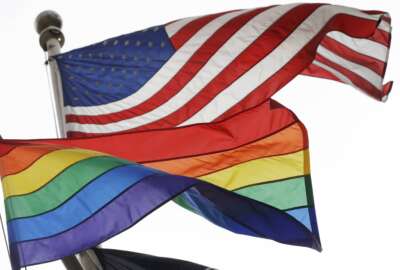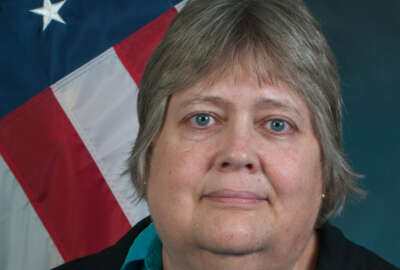Transgender veteran advocates are calling on a federal court to expedite the Department of Veterans Affairs’ plans to cover gender-confirmation surgery.
The Transgender American Veterans Association (TAVA) and Yale Law School’s Veterans Legal Services Clinic filed a lawsuit against the VA on Thursday.
The lawsuit states rulemaking delays have kept the VA from providing the gender-affirming surgery it promised to cover more than two years ago.
TAVA filed a rulemaking petition nearly eight years ago, asking the VA to update its policy that excludes gender-confirmation surgery from the medical benefits it provides.
K.N. McCleary, a law student intern representing TAVA, said the lawsuit specifically seeks a writ of mandamus from the court, which would compel VA to respond to the group’s 2016 rulemaking petition.
“These veterans deserve an answer from VA on the question TAVA posed nearly eight years ago: Will VA provide transgender veterans with the care it has promised or not?” McCleary told reporters in a press conference Thursday.
McCleary said many transgender veterans receive other gender-affirming care, such as hormone replacement therapy, from VA. But VA doctors, they added, are often wary of making referrals to outside providers because of the department’s non-coverage of gender-confirmation surgery.
“As a result, transgender veterans are worse off than many civilians despite the sacrifices they have made for their country,” McCleary said.
VA Secretary Denis McDonough in a July 2021 speech at a Pride Month event in Orlando, Florida, said the VA plans to add gender confirmation surgery to the list of benefits it offers to vets in its health care system.
During the speech, McDonough said the VA was taking these steps as part of an effort to overcome a “dark history” of discrimination against transgender military service members.
VA, however, said the changes will likely take years to fully implement, but that they were made with the recommendation of its own clinicians.
But two and a half years later, TAVA says the rulemaking process remains ongoing, with no timeline on when it will conclude.
“Enough is enough. It’s time for the VA to show us what they really want to do,” TAVA President Bekky Eshler told reporters in a press conference Thursday.
VA Press Secretary Terrence Hayes said in a statement Thursday that the proposed rule is continuing through VA’s rulemaking process, “and is being considered carefully and thoroughly, with full understanding of its importance and urgency.”
“There are several steps to take, which will take time. But we are moving ahead, methodically, because we want this important change in policy to be implemented in a manner that has been thoroughly considered to ensure that the services made available to veterans meet VA’s rigorous standards for quality health care,” Hayes said.
VA provides other types of gender-affirming care to veterans — including medical care, support groups and mental health services.
Former TAVA President Ann Murdoch, a retired Army colonel with 24 years of military service, said she suffered from major depression, anxiety attacks, insomnia and suicidal thoughts from her gender dysphoria.
“When I went to the VA for care, my doctor made it clear that she didn’t really want to talk about my gender dysphoria. She wasn’t comfortable treating me and made me feel really unwelcome and uncomfortable,” Murdoch said.
Murdoch said she got “life-saving” surgical intervention through her private health insurance, and had the support of her friends and family in the Washington, D.C. metro area.
“Relationships got better. I was more present and focused at work. My performance got better. It was good all around, and that surgical intervention was a very important piece of that,” she said. “I should not have had to fight so hard and so long to get that surgical intervention. I was one of the lucky ones.”
Murdoch urged the VA to expedite its rulemaking process and to deliver gender-confirming care to veterans as promised.
“When Secretary McDonough first announced the rule change was going to happen, I was elated. We cheered for that. And when people were impatient, I counseled patience, but I knew it takes some bureaucratic processing to actually implement real change … The time for patience has expired long ago. Now it’s the time for action.”
Natalie Kastner, an Army veteran and TAVA member, received her gender dysphoria diagnosis in 2022.
Kastner said she repeatedly attempted to access gender-affirming surgery through civilian health insurance, but she said health care policies in her home state of Texas have made this virtually impossible.
She said that’s forced her to consider moving to another state, away from her friends and family, where civilian health insurance might cover gender confirmation surgery.
“The VA’s delay forces me to choose between lifesaving medical care, and my children, my friends, and my family. It is an impossible choice. In the face of the seemingly endless delay, I feel I am left with no viable options to live a full and dignified life,” Kastner said.
Kastner said the VA’s inaction has transgender veterans “trapped in a state of limbo.”
“For us, the VA’s failure to provide gender-affirming surgery has been more dangerous than our time in service,” Kastner said.
Sarah Klimm, a representative for Minority Veterans of America, said transgender veterans are twice as likely to die by suicide than their cisgender counterparts, and nearly six times more likely than the general population to die by suicide.
Klimm said there are about 134,000 transgender veterans, and that one in five transgender Americans will serve in the military service at some point in their lives.
“Research emphasizes that affirming health care significantly contributes to the mental well-being of transgender individuals. Yet, our veterans who shoulder the weight of duty and sacrifice are left in a state of uncertainty and denied the medical care that could provide solace and healing,” Klimm said.
Former Special Assistant to the Assistant Secretary of the Army Tammy Smith, a retired major general, said the VA’s current prohibition on covering gender-confirmation surgery “violates my sense of fairness.”
“We owe equal access to the health care provided by this framework that the VA already uses. Transgender veterans are part of this framework already based on the service to our country, and they are currently excluded as a class of veterans,” Smith said.
TAVA officials said VA health care remains a major recruitment incentive for military service, and that mental health of transgender veterans is disproportionately affected by the lack of access to gender confirmation surgery.
“If we can’t get that, it’s going to make the recruiting situation even worse,” Murdoch said.
If you or someone you know is having thoughts of suicide, contact the Veterans Crisis Line to receive free, confidential support and crisis intervention available 24 hours a day, 7 days a week, 365 days a year. Dial 988 then Press 1, chat online at VeteransCrisisLine.net/Chat, or text 838255.
Copyright
© 2024 Federal News Network. All rights reserved. This website is not intended for users located within the European Economic Area.





